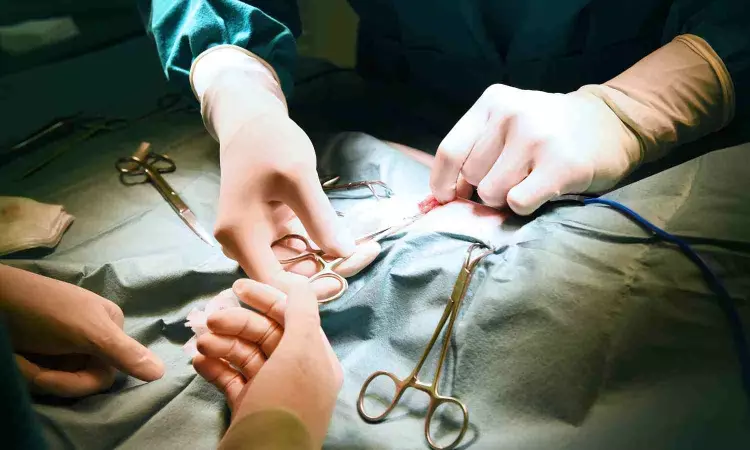- Home
- Medical news & Guidelines
- Anesthesiology
- Cardiology and CTVS
- Critical Care
- Dentistry
- Dermatology
- Diabetes and Endocrinology
- ENT
- Gastroenterology
- Medicine
- Nephrology
- Neurology
- Obstretics-Gynaecology
- Oncology
- Ophthalmology
- Orthopaedics
- Pediatrics-Neonatology
- Psychiatry
- Pulmonology
- Radiology
- Surgery
- Urology
- Laboratory Medicine
- Diet
- Nursing
- Paramedical
- Physiotherapy
- Health news
- Fact Check
- Bone Health Fact Check
- Brain Health Fact Check
- Cancer Related Fact Check
- Child Care Fact Check
- Dental and oral health fact check
- Diabetes and metabolic health fact check
- Diet and Nutrition Fact Check
- Eye and ENT Care Fact Check
- Fitness fact check
- Gut health fact check
- Heart health fact check
- Kidney health fact check
- Medical education fact check
- Men's health fact check
- Respiratory fact check
- Skin and hair care fact check
- Vaccine and Immunization fact check
- Women's health fact check
- AYUSH
- State News
- Andaman and Nicobar Islands
- Andhra Pradesh
- Arunachal Pradesh
- Assam
- Bihar
- Chandigarh
- Chattisgarh
- Dadra and Nagar Haveli
- Daman and Diu
- Delhi
- Goa
- Gujarat
- Haryana
- Himachal Pradesh
- Jammu & Kashmir
- Jharkhand
- Karnataka
- Kerala
- Ladakh
- Lakshadweep
- Madhya Pradesh
- Maharashtra
- Manipur
- Meghalaya
- Mizoram
- Nagaland
- Odisha
- Puducherry
- Punjab
- Rajasthan
- Sikkim
- Tamil Nadu
- Telangana
- Tripura
- Uttar Pradesh
- Uttrakhand
- West Bengal
- Medical Education
- Industry
Not placing drain may reduce rates of pancreatic leaks and hospital stay after distal pancreatectomy: Study

Research led by Amsterdam UMC across ten Dutch hospitals and two Italian hospitals has found that not placing a drain during surgery improves outcomes in patients undergoing a left-sided pancreatic resection, also known as ‘distal pancreatectomy’. The study, today published in Lancet Gastroenterology & Hepatology, set out to confirm the safety of drainless surgery, as compared to the current routine practice of leaving a surgical drain. Ultimately, the study not only confirmed the safety of ‘drainless surgery’ but, in addition, demonstrated that this approach reduced the rates of postoperative pancreatic leaks and overall morbidity and hospital stay.
"This study is expected to close a longstanding debate among surgeons" says Marc Besselink, professor of surgery at Amsterdam UMC and principal investigator of the study, "in an era where medicine is increasingly becoming more complex and costly, this study actually shows that omitting an intervention actually improves outcome. Sometimes, less is more”.
Surgeons traditionally place a drain to facilitate the removal of fluids such pancreatic juice, that could build-up after surgery, in patients undergoing distal pancreatectomy. This is routine practice due to the high (25%) risk of postoperative leaks which may have serious consequences. However, an increasingly large group of surgeons have argued that many of these leaks stop spontaneously and that leaving a percutaneous surgical drain actually increases the risk of complications as it may facilitate leaks and increase the risk of infection.
The PANDORINA trial set out to investigate this and included 282 patients undergoing distal pancreatectomy. The primary goal was to demonstrate that drainless surgery was safe in terms of major complications. This succeeded. Secondarily, the study showed that the rates of detected postoperative leaks decreased by 15% (from 27% to 12%) in patients undergoing drainless surgery and the rate of overall complications also reduced (from 51% to 33%).
“The benefit of drainless surgery is much larger than we anticipated before the trial,” adds Professor Roberto Salvia from the Pancreas Institute in Verona, and for our colleagues this is very compelling evidence". In order to facilitate this, the researchers have already shared their findings at several international symposia. "We expect that drainless surgery for distal pancreatectomy will now enter the international guidelines and become part of daily practice for pancreatic surgeons across the world" says Ward van Bodegraven, researcher at Amsterdam UMC and coordinator of the trial.
Reference:
Eduard A van Bodegraven, Alberto Balduzzi, Tess M E van Ramshorst, Prof Giuseppe Malleo, Frederique L Vissers, Jony van Hilst, Prophylactic abdominal drainage after distal pancreatectomy (PANDORINA): an international, multicentre, open-label, randomised controlled, non-inferiority trial, The Lancet Gastroenterology & Hepatology, https://doi.org/10.1016/S2468-1253(24)00037-2.
Dr Kamal Kant Kohli-MBBS, DTCD- a chest specialist with more than 30 years of practice and a flair for writing clinical articles, Dr Kamal Kant Kohli joined Medical Dialogues as a Chief Editor of Medical News. Besides writing articles, as an editor, he proofreads and verifies all the medical content published on Medical Dialogues including those coming from journals, studies,medical conferences,guidelines etc. Email: drkohli@medicaldialogues.in. Contact no. 011-43720751


